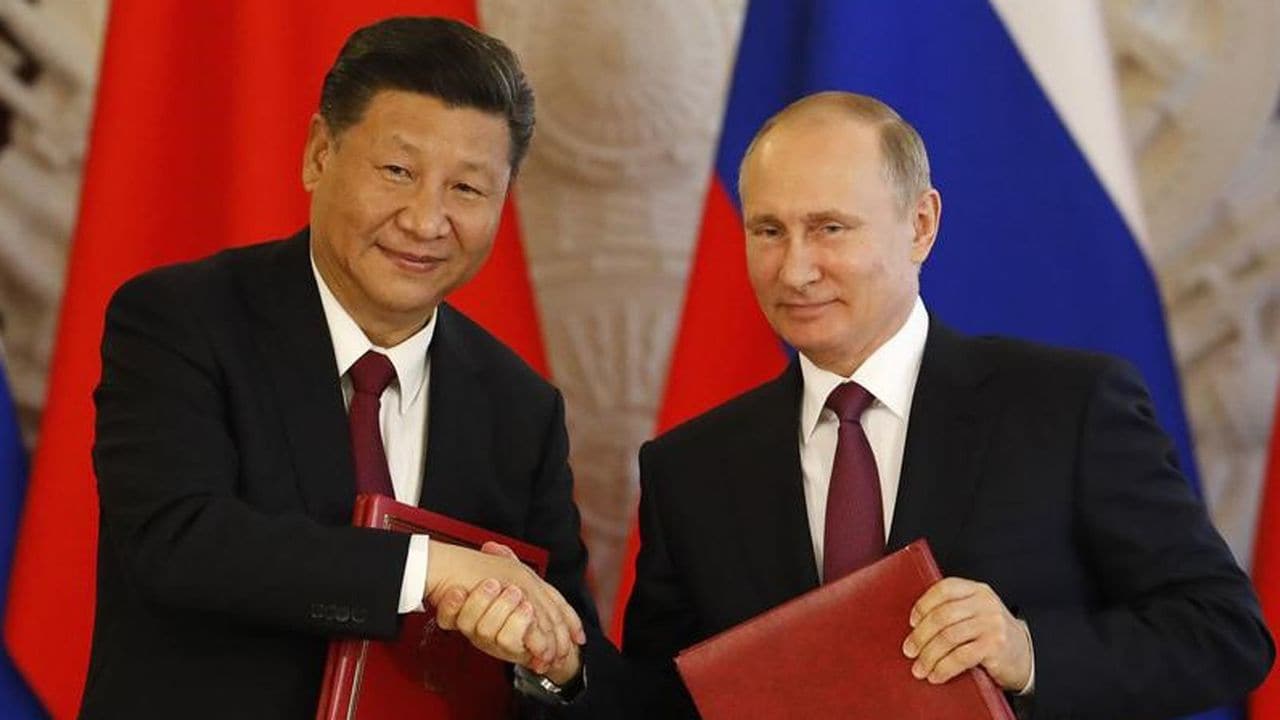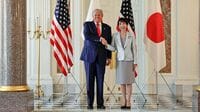
The most dangerous impact of North Korea’s long-range missile test this past week may not have been the one in the Sea of Japan, felt in Washington, Seoul and Tokyo. It was in Moscow where Chinese leader Xi Jinping and Russian President Vladimir Putin locked arms in a united front on how to respond to the growing North Korea crisis. The target of this front was not, however, North Korea. It was the United States, who the Sino-Russian axis accused of pursuing a military “buildup” in the region.
As they prepared to head off to the G20 meeting in Germany, the Russian and Chinese leaders seemed only too happy to use the North Korean launch to their advantage. The joint statement issued by the two governments embraced the Chinese and Russian approach of a purported ‘even handed’ approach to halting tensions.
According to the Chinese version of this concept, the North Koreans would “voluntarily” declare a moratorium on nuclear tests and ballistic rocket launches and the U.S. and South Korea would halt carrying out “large-scale joint exercises” of the two militaries.
This is an idea that the U.S. and South Korea have already firmly rejected, recognizing it as a means to effectively drive the American military presence off the Korean peninsula. The North Koreans, for their part, have long sought an end to the military exercises, aiming to drive a wedge between the U.S. and its South Korean ally.
The Russians also offered full support to China’s continued opposition to the deployment of the Theater High Altitude Area Defense (THAAD) ballistic missile defense system in South Korea. This deployment “seriously damages strategic security interests of regional powers, including Russia and China,” said the joint statement.
“Russia and China oppose the deployment of such systems and call on the relevant countries to immediately halt and cancel the process of deployment.”
Russian analysts have gleefully asserted that this new front is the product of the failure of Donald Trump’s bid to have China ‘solve’ the North Korea problem. And they tie this development to the alleged retreat of Trump from his earlier commitment to improve ties with Russia, a back off engineered in this view by the pressure of the American establishment.
As recently as this week, Trump was still holding out hope that China would “put a heavy move on North Korea and end this nonsense once and for all!” But there are hardly any American policy makers who share that hope, even from the beginning of the Trump campaign to woo Chinese leader Xi, wining and dining him his Mar A-Largo country club.
Instead the Trump administration has shown increasing levels of irritation at China, resuming arms sales to Taiwan and threatening tariffs against illegal Chinese exports. Trump’s latest tweets, as he headed to Europe, visibly displayed his frustration – “So much for China working with us – but we had to give it a try.”
Instead of a deal with Beijing, “now the U.S. faces a Russia-China axis that is tighter than ever,” says Artyom Lukin, a leading Russian scholar on Asia at Vladivostok’s Far Eastern Federal University.
“China and Russia want the US to drastically weaken its predominant strategic grip on Northeast Asia, at least with respect to the Korean Peninsula,” observes Lukin. “Unless the US is ready to start moving toward a new security architecture in the region, one in which its military-strategic footprint in Northeast Asia considerably shrinks, Beijing and Moscow will continue to keep North Korea afloat and protect it from any serious pressure.”
The Russian analyst dismisses the Trump administration’s belief that China might step in to resolve the North Korean crisis.
“It was naïve from the very beginning to expect that Xi Jinping would abandon North Korea, an important geopolitical asset, in exchange for some trade concessions from the US,” he told Toyo Keizai. The same, he believes, is also true for Russia, which is unlikely to cooperate on North Korea with the U.S.
“Moscow, of course, is no ally of Pyongyang,” argues Dmitri Trenin, the director of the Carnegie Moscow center who has followed Putin’s ‘pivot to Asia’ closely.
“It finds the Kim family headstrong and difficult… The Russians, however, do not regard the North Korean leaders as irrational: The opposite is likely to be true. They understand that to Pyongyang nuclear weapons are the ultimate guarantee of regime survival. The ruling Kims have certainly learned this from the fate of both Saddam Hussein in Iraq and Muammar Gaddafi in Libya.”
Russian policy toward North Korea, Trenin wrote in May, is mainly dictated by both the desire to stop what it fears would be American military activity in Korea, on its border, and by the primacy of its pursuit of a strategic alliance with China. For China, North Korea has “prime geopolitical importance,” the Russian analyst notes. “Having established a stable partnership, a sort of major-power entente with Beijing, Moscow would be foolish to try to undercut China in a region of secondary importance to itself.”
The Russians have entertained the idea that they might play a mediating role in the North Korea crisis. And they have tried to increase their leverage by increasing the still small flow of trade with Pyongyang, including loading oil shipments to the North from its Far Eastern ports.
An estimated 30-40,000 North Korean workers are now working in Russia, on construction projects such as stadiums for the World Cup in St Petersburg to logging and farming in the Russian Far East.
But these limited efforts are not meant to supplant the role that China plays as the patron of North Korea. “Working at cross-purposes with Beijing, in order to please the US, Japan or South Korea, is simply not an option, given the current confrontation between Moscow and Washington,” writes Trenin. “Russia will not necessarily follow China every step of the way on North Korea, but will certainly abstain from doing anything against China's interest.”
That Russian strategy was on full display this week in Moscow. While the two leaders trumpeted their growing economic interaction, from gas pipelines to increasing Chinese investment in Russia, the main message was aimed at the U.S. And the timing, heading into the G-20 meeting in Germany, was clear.



